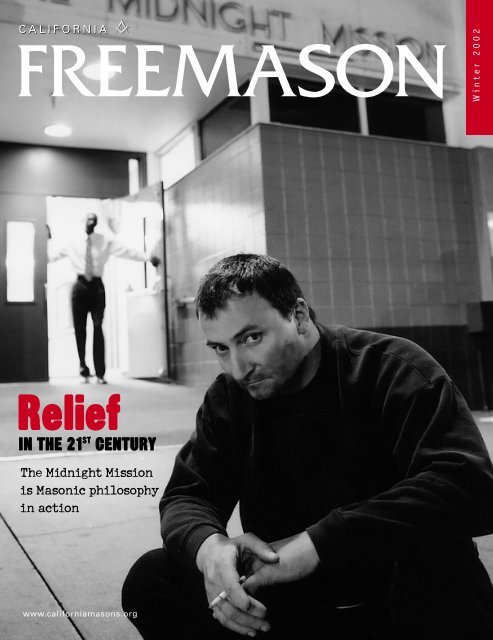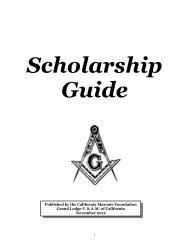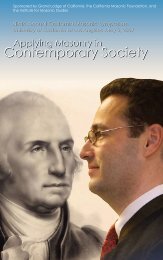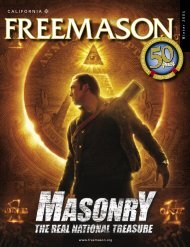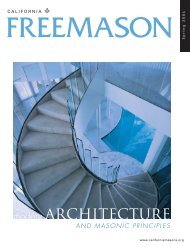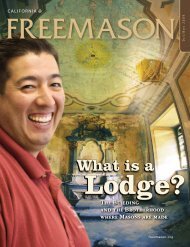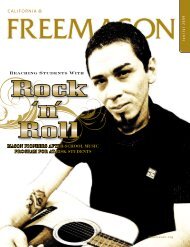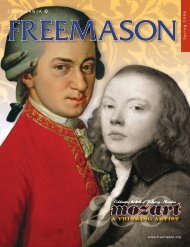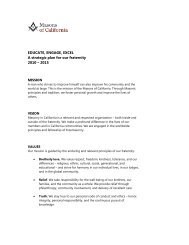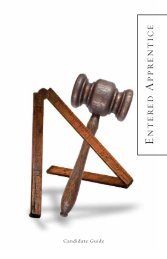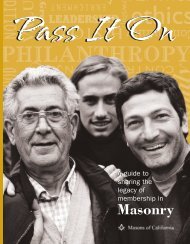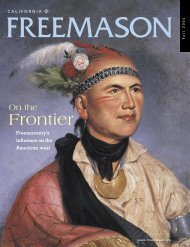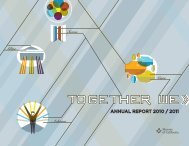Winter 2002 (4.6MB) - Grand Masonic Lodge of California
Winter 2002 (4.6MB) - Grand Masonic Lodge of California
Winter 2002 (4.6MB) - Grand Masonic Lodge of California
You also want an ePaper? Increase the reach of your titles
YUMPU automatically turns print PDFs into web optimized ePapers that Google loves.
CALIFORNIA<br />
FREEMASON<br />
Relief<br />
IN THE 21 ST CENTURY<br />
The Midnight Mission<br />
is <strong>Masonic</strong> philosophy<br />
in action<br />
www.californiamasons.org<br />
<strong>Winter</strong> <strong>2002</strong>
A STUDENT IN DISTRESS MAY NOT ASK FOR HELP.<br />
With early intervention, troubled students have a greater<br />
chance <strong>of</strong> redirecting their lives before it’s too late.<br />
The <strong>Masonic</strong> Student Assistance Program gives teachers<br />
the skills to detect warning signs <strong>of</strong> low self-esteem,<br />
depression, violence, suicide, parental neglect, substance<br />
abuse, and other problems.<br />
Since 1994, charitable giving to the <strong>California</strong> <strong>Masonic</strong><br />
Foundation has enabled 3,500 <strong>California</strong> educators to<br />
assist more than 30,000 students.<br />
For more information about MSAP, go to<br />
www.californiamasons.org.
CALIFORNIA<br />
FREEMASON<br />
VOLUME 51<br />
DECEMBER 1, <strong>2002</strong><br />
NUMBER 1<br />
PUBLICATION BOARD<br />
M. William Holsinger, <strong>Grand</strong> Master<br />
John L. Cooper III, <strong>Grand</strong> Secretary<br />
EDITORIAL STAFF<br />
Allan L. Casalou, Managing Editor<br />
Kimberly B. Rogers, Copy Editor<br />
Steffani Kizziar, <strong>Masonic</strong> Homes Editor<br />
Brad Bradbury, Online Editor<br />
CONTRIBUTORS<br />
Ann Lyon Dudley<br />
Rob Ellis<br />
Andrew Horn<br />
Douglas D. Ismail<br />
Terry L. Mendez<br />
Alison Steiner Miller<br />
PHOTOGRAPHERS<br />
David Braun Photography<br />
Alison Steiner Miller<br />
Moulin Studios<br />
Andrew Horn<br />
Ann Felipe<br />
Alec Duncan<br />
Art direction by TLM Communications<br />
Design by Burritt Design<br />
Cover by Mark Dastrup Photography<br />
OFFICERS OF THE GRAND LODGE<br />
GRAND MASTER<br />
M. William Holsinger, Evergreen No. 259<br />
DEPUTY GRAND MASTER<br />
Howard D. Kirkpatrick, Reading No. 254<br />
SENIOR GRAND WARDEN<br />
David R. Doan, Sunset No. 369<br />
JUNIOR GRAND WARDEN<br />
Frederick L. Sorsabal, El Dorado No. 26<br />
GRAND TREASURER<br />
Warren J. Blomseth, Crow Canyon No. 551<br />
GRAND SECRETARY<br />
John L. Cooper III, Culver City-Foshay No. 467<br />
GRAND LECTURER<br />
Harold A. Macy, Palmdale No. 769<br />
www.californiamasons.org<br />
CALIFORNIA FREEMASON<br />
(USPS 083-940) is published quarterly by the<br />
Publishing Board and is the only <strong>of</strong>ficial<br />
publication <strong>of</strong> the <strong>Grand</strong> <strong>Lodge</strong> <strong>of</strong> Free and<br />
Accepted Masons <strong>of</strong> the State <strong>of</strong> <strong>California</strong>,<br />
1111 <strong>California</strong> St., San Francisco, CA<br />
94108-2284.<br />
Phone: 800/831-8170 or 415/776-7000;<br />
fax: 415/776-0483;<br />
e-mail: editor@freemason.org.<br />
Publication Office – Publication <strong>of</strong>fices at the<br />
<strong>Grand</strong> <strong>Lodge</strong> Offices, 1111 <strong>California</strong> Street,<br />
San Francisco, CA 94108-2284. Periodicals<br />
Postage Paid at San Francisco, CA and at<br />
additional mailing <strong>of</strong>fices.<br />
Postmaster – Send address changes to<br />
<strong>California</strong> Freemason, 1111 <strong>California</strong> Street,<br />
San Francisco, CA 94108-2284.<br />
Publication Dates – Publication dates are the<br />
first day <strong>of</strong> December, March, June, and<br />
September.<br />
Subscriptions – CALIFORNIA FREEMASON is<br />
mailed to every member <strong>of</strong> this <strong>Masonic</strong><br />
jurisdiction without additional charge. Others<br />
are invited to subscribe for $2.00 a year or<br />
$2.75 outside <strong>of</strong> the United States.<br />
Permission to reprint – Permission to reprint<br />
original articles in CALIFORNIA FREEMASON is<br />
granted to all recognized <strong>Masonic</strong> publications<br />
with credit to the author and this publication.<br />
5 in california<br />
The Kids ID program gives parents<br />
peace <strong>of</strong> mind.<br />
10 lodge spotlight<br />
Southern <strong>California</strong> lodges join<br />
together to assist the <strong>Grand</strong><br />
<strong>Lodge</strong> <strong>of</strong> Hungary.<br />
11 masonic education<br />
A look at <strong>Masonic</strong> relief in the<br />
18th century.<br />
15 membership<br />
While total membership has been<br />
declining for years, <strong>2002</strong> marks a<br />
rise in the number <strong>of</strong> degrees<br />
conferred — a promising sign for<br />
Masonry in <strong>California</strong>.<br />
C ONTENTS<br />
cover story 12<br />
What does <strong>Masonic</strong> relief mean to us today, in the<br />
21st century? In 1914, relief was providing a meal<br />
to someone in need. Today, relief might be<br />
assistance with chemical dependency, protection<br />
from an abusive husband, or teaching someone the<br />
skills needed to get a job. The Midnight Mission is<br />
an inspiring story <strong>of</strong> <strong>Masonic</strong> relief in action. This<br />
issue looks at the many faces <strong>of</strong> <strong>Masonic</strong> relief and<br />
how they have evolved throughout history.<br />
16 history<br />
Relief becomes a Mason’s central<br />
duty during one <strong>of</strong> the nation’s<br />
worst disasters.<br />
18 around the world<br />
The <strong>Grand</strong> <strong>Lodge</strong> <strong>of</strong> the Czech<br />
Republic receives support from<br />
Masons worldwide after being<br />
devastated by floods.<br />
20 masonic homes<br />
Lauryn Taylor becomes the first<br />
known Mason to grow up in the<br />
Children’s Home at Covina and<br />
retire at the <strong>Masonic</strong> Home at<br />
Union City.<br />
<strong>California</strong> Freemason 3 <strong>Winter</strong> <strong>2002</strong>
E DITORIAL<br />
Executive Message<br />
Let them know you care<br />
What an honor and privilege it is<br />
for me to have been elected to<br />
serve as the grand master <strong>of</strong> this<br />
great jurisdiction. I shall endeavor to carry<br />
on the rich traditions <strong>of</strong> my predecessors.<br />
The theme for this year will be<br />
“Freemasonry seeks good men and makes<br />
them better — tell a friend.” Central to this<br />
theme is membership development and<br />
<strong>Masonic</strong> education. These are the issues<br />
we will be emphasizing this year, but now I<br />
want to call your attention to one <strong>of</strong> the<br />
three principal tenets <strong>of</strong> Masonry — relief.<br />
In the first degree we were all reminded<br />
that “to relieve the distressed is a duty<br />
incumbent on all men, but particularly on<br />
Masons.”<br />
When those gold-seeking 49ers found<br />
their way to <strong>California</strong>, some with lodge<br />
charters in their saddlebags, many had left<br />
their wives and families hundreds <strong>of</strong> miles<br />
behind, not knowing whether they would<br />
ever see them again. I am confident one <strong>of</strong><br />
the reasons they established <strong>Masonic</strong><br />
lodges in the frontier was to establish a<br />
connection with men <strong>of</strong> similar values,<br />
with the knowledge that Masons are<br />
compassionate, caring men. They also<br />
knew they were taking a step toward caring<br />
for those loved ones far away. Remember<br />
that Medicare and health insurance did<br />
not exist. There was no Social Security, and<br />
men were left to their own resourcefulness<br />
<strong>California</strong> Freemason 4 <strong>Winter</strong> <strong>2002</strong><br />
to care for themselves and their families.<br />
History discloses that most miners<br />
found little gold, some died looking, and<br />
many contracted fatal illnesses. One <strong>of</strong> the<br />
original lodges, Jennings <strong>Lodge</strong> No. 4 in<br />
Sacramento, expended all its assets caring<br />
for the sick in the great influenza<br />
epidemic, and the lodge ceased to exist.<br />
In the 21st century, our challenge is<br />
quite different, yet basically the same.<br />
While we are fortunate to be able to<br />
provide for our times <strong>of</strong> poor health<br />
through various forms <strong>of</strong> insurance, the<br />
basic need for human involvement is still<br />
the same. Newly discovered drugs can<br />
relieve pain and suffering, but there are<br />
times when a kind word from a friend will<br />
do far more to relieve a broken heart than<br />
all the drugs science has created.<br />
It is the responsibility <strong>of</strong> each one <strong>of</strong> us<br />
to remember our sick and lonely friends,<br />
neighbors, and brother Masons. At times<br />
when the need is too great for an<br />
individual, the lodge should move into<br />
action. When the need is overwhelming,<br />
our <strong>Masonic</strong> Homes stand ready to<br />
provide assistance.<br />
But remember, the responsibility<br />
belongs to every Mason to be a friend to<br />
those who are not as fortunate as you.<br />
Make a commitment to yourself that<br />
during this year, you will visit someone<br />
who is sick or lonely and let that person<br />
know that you care. You will be glad you<br />
did, and so will they.<br />
While you are making that visit, keep<br />
your eyes open for that good man who has<br />
not yet learned about Masonry. If you find<br />
him, enlighten him, and maybe he will ask<br />
to know more.<br />
Freemasonry seeks good men and<br />
makes them better — tell a friend!<br />
M. William Holsinger<br />
grand master
Giving parents peace <strong>of</strong> mind<br />
Kids ID program prepares parents for the unthinkable<br />
It’s every parent’s worst nightmare:<br />
Your child is missing. What do you<br />
do? With several high-pr<strong>of</strong>ile<br />
abduction cases and increasing<br />
media coverage, parental awareness<br />
and concern is on the rise.<br />
I N C ALIFORNIA<br />
Indeed, the statistics are sobering. About 800,000<br />
children are reported missing each year in the United<br />
States. And it’s estimated that the total number <strong>of</strong><br />
missing children (including those that are not<br />
reported) is as high as 1.3 million per year.<br />
Law enforcement <strong>of</strong>ficials say that when a child is<br />
missing, a current picture, fingerprint, and physical<br />
information is critical in the crucial first hours. The<br />
Kids ID program puts this information in parents’ Members <strong>of</strong> San Diego <strong>Lodge</strong> No. 35 provided Kids ID service at a local school’s Halloween<br />
hands. The program’s biggest benefit, however, is to<br />
parents’ peace <strong>of</strong> mind. Having this information gives<br />
festival. About 100 children were IDed at this event, bringing the lodge’s total for the year<br />
to 1,000 kids.<br />
parents comfort that they are prepared — just in case.<br />
KIDS ID SUCCESSFUL FROM START<br />
“Parents are extremely interested in how the identification The Kids ID program began in 1998 when the <strong>California</strong><br />
sheet works,” says Kenneth Miller, master <strong>of</strong> Ontario <strong>Lodge</strong> <strong>Masonic</strong> Foundation purchased three systems. The<br />
No. 301. “Parents tell me that it’s a big relief not only to have Foundation systems are loaned to lodges for use at local fairs,<br />
this information on hand, but more importantly, to know what festivals, and community events.<br />
to do in case they ever need to use it.”<br />
From the start, Kids ID events have been highly successful.<br />
JUST IN CASE<br />
As more and more lodges saw a need for Kids ID events in<br />
One parent at a recent Kids ID event in San Diego said,<br />
their communities, demand for the systems was soon so great<br />
“With so many kidnappings in the news, you realize it can<br />
that the Foundation began selling the s<strong>of</strong>tware to individual<br />
happen to anybody. As a parent, you start to wonder what<br />
lodges.<br />
you’d do if it was your child. I have lots <strong>of</strong> pictures around, but<br />
Almost five years later, more than 40 lodges have purchased<br />
I don’t have fingerprints. God forbid I ever need to use [the<br />
the s<strong>of</strong>tware and their own equipment. The Foundation now<br />
identification sheet], but I know I have it ready if I need it.<br />
owns 11 systems that are loaned to lodges, as well as a<br />
That helps me sleep a little easier at night.”<br />
complete booth setup that is used for bigger fairs.<br />
Since the program began in 1998, well over 200,000 parents<br />
In today’s stressful, dangerous world, parents have plenty to<br />
have received Kids ID identification sheets for their children.<br />
worry about. Giving them the peace <strong>of</strong> mind that they are<br />
Ontario <strong>Lodge</strong> alone has IDed over 5,000 children in the three<br />
years they’ve been participating in the program. “We get a lot<br />
prepared for the worst helps ease that burden.<br />
<strong>of</strong> parents who seek us out because they’ve heard about the<br />
For information about lodge participation in this<br />
program from friends or relatives,” says Miller. “The parents<br />
are very appreciative <strong>of</strong> the service we provide. Many <strong>of</strong><br />
them come back year after year to make sure their child’s<br />
picture is current.”<br />
community service, visit www.freemason.org/kids.<br />
<strong>California</strong> Freemason 5 <strong>Winter</strong> <strong>2002</strong>
I N C ALIFORNIA<br />
153 rd<br />
Annual<br />
Communication<br />
SIGNIFICANT ACTIONS AND IMPORTANT MOMENTS IN MASONRY<br />
The 153rd Annual<br />
Communication is over, but<br />
the decisions reached and the<br />
events experienced will have a<br />
lasting impact on the fraternity<br />
and those who attended.<br />
MINIMUM AGE SET AT 18<br />
“I look for the day when a young<br />
soldier who goes <strong>of</strong>f to defend his country<br />
can take with him the principles that<br />
Freemasonry has taught him.” This day,<br />
as described by Past <strong>Grand</strong> Master David<br />
C. Decker, has dawned. In a landmark<br />
vote, the delegates <strong>of</strong> the 153rd Annual<br />
Communication adopted <strong>Grand</strong> Master<br />
Decker’s Recommendation No. 1, carried<br />
over from the previous year, changing the<br />
<strong>California</strong> Freemason 6 <strong>Winter</strong> <strong>2002</strong><br />
minimum age for membership in<br />
<strong>California</strong> from 21 to 18 years.<br />
Similar resolutions have come before<br />
the <strong>Grand</strong> <strong>Lodge</strong> a dozen times since<br />
1971. Prior versions <strong>of</strong> this legislation<br />
have proposed changing the age to 19, or<br />
changing the age to 18 for members <strong>of</strong><br />
DeMolay or for sons <strong>of</strong> Masons. Until<br />
recently, the legislation never received<br />
even a simple majority. In 2001, it<br />
appeared on the ballot again, but for the<br />
first time, it was a <strong>Grand</strong> Master’s<br />
Recommendation. Nearly 80 percent <strong>of</strong><br />
the 2001 delegates voted in favor <strong>of</strong> the<br />
recommendation, just shy <strong>of</strong> the necessary<br />
five-sixths majority, but enough to put it<br />
on the <strong>2002</strong> ballot. With some 78 percent<br />
<strong>of</strong> the delegates voting in favor, the<br />
recommendation became law.<br />
<br />
<strong>California</strong> is the last state on the West<br />
Coast to accept applications at age 18.<br />
Oregon did so in 1983 and Washington in<br />
1994. According to the <strong>Masonic</strong><br />
Leadership Center, there are only 16<br />
states in the United States that maintain<br />
21 as the minimum age.<br />
VISITING DEGREES APPROVED<br />
For more than 50 years, the Oklahoma<br />
<strong>Masonic</strong> Indian Degree team has<br />
conferred the third degree in a colorful<br />
Native American tradition, including full<br />
ceremonial dance regalia and traditional<br />
Native American hymns. This team has<br />
performed more than 800 third degrees in<br />
many states across the nation, including<br />
<strong>California</strong>. However, our <strong>Masonic</strong> law<br />
previously did not permit the degree to<br />
be conferred upon a <strong>California</strong> candidate.<br />
With the adoption <strong>of</strong> <strong>Grand</strong> Master<br />
Whitaker’s Recommendation No. 6, a
<strong>California</strong> lodge may, with the specific<br />
permission <strong>of</strong> the <strong>Grand</strong> Master and in<br />
accordance with all pertinent sections <strong>of</strong><br />
the <strong>California</strong> <strong>Masonic</strong> Code, invite a lodge<br />
or degree team from another jurisdiction<br />
(like the Oklahoma <strong>Masonic</strong> Indian Degree<br />
team) to confer a degree upon a candidate<br />
from the inviting <strong>California</strong> lodge.<br />
DUES OPTION FAVORED<br />
It was Sam Ewing who said, “Inflation is<br />
when you pay $15 for the $10 haircut you<br />
used to get for $5 when you had hair.”<br />
However humorous his quip, inflation is a<br />
part <strong>of</strong> life, and each year the delegates <strong>of</strong><br />
<strong>Grand</strong> <strong>Lodge</strong> consider the impact <strong>of</strong><br />
inflation and the necessary costs <strong>of</strong><br />
operating the <strong>Grand</strong> <strong>Lodge</strong> and its various<br />
programs when they approve the <strong>Grand</strong><br />
<strong>Lodge</strong> budget and per capita assessment.<br />
The result is that the per capita<br />
assessment increases by a few percent each<br />
year, but lodge dues are not easily adjusted<br />
to accommodate the additional burden.<br />
Thus, lodges have fewer operating dollars<br />
unless they adjust their dues every year.<br />
Proponents <strong>of</strong> Resolution 02-01 sought<br />
to permit lodges, if they choose, to<br />
automatically increase dues when the<br />
<strong>Grand</strong> <strong>Lodge</strong> per capita is increased. This<br />
resolution received high approval, with 80<br />
percent <strong>of</strong> the delegates voting in favor <strong>of</strong><br />
its adoption. Having not met the necessary<br />
five-sixths majority, but with more than a<br />
simple majority, it will be carried over<br />
to 2003.<br />
<br />
PUBLIC OPENING<br />
CELEBRATES YOUTH<br />
“I stand before you as a young man who<br />
has been inspired by Masonry,” declared<br />
Matt Milde, Northern <strong>California</strong> DeMolay<br />
master councilor, as he spoke to the crowd<br />
<strong>of</strong> 1,200 assembled for the Public Opening<br />
<strong>of</strong> <strong>Grand</strong> <strong>Lodge</strong> on Sunday, October 13.<br />
According to Milde, his life’s actions and<br />
values have been shaped by Masons,<br />
primarily those who serve as DeMolay<br />
advisors. Speeches were also delivered by<br />
the youth leaders <strong>of</strong> Rainbow for Girls and<br />
Job’s Daughters as well as the master<br />
councilor <strong>of</strong> Southern <strong>California</strong> DeMolay.<br />
Three <strong>California</strong> Masons were presented<br />
with the <strong>Grand</strong> Master’s Youth Service<br />
Award for their outstanding service to<br />
<strong>Masonic</strong> youth organizations. For the first<br />
time in <strong>California</strong>, Masons who gave<br />
notable service to the Boy Scouts were<br />
honored with the Daniel Carter Beard<br />
<strong>Masonic</strong> Scouter Award.<br />
Finishing the youth-centered program,<br />
46 children from the <strong>Masonic</strong> Home at<br />
Covina made a thought-provoking<br />
presentation with a video describing the<br />
children’s program at Covina (see page 22).<br />
AMERICAN EXTRAVAGANZA<br />
BENEFITS LEARNING DISABLED<br />
It was a star-spangled evening atop Nob<br />
Hill when a cast <strong>of</strong> 20 took an audience <strong>of</strong><br />
700 on a patriotic ride through history.<br />
“I look for the day when a young soldier<br />
who goes <strong>of</strong>f to defend his country can take<br />
with him the principles that Freemasonry<br />
has taught him.”<br />
<br />
“If you are allergic to flags, patriotic words,<br />
unabashed tub-thumping <strong>of</strong> any kind,”<br />
warned Gene Collins, program director,<br />
“I suggest you leave the auditorium<br />
immediately before the lights go down and<br />
you are trapped in a patriotic melee <strong>of</strong> love<br />
for our country.”<br />
The Monday evening entertainment,<br />
titled “An American Extravaganza For<br />
People Who Love America” was kicked <strong>of</strong>f<br />
by Rachel Kerstner, a member <strong>of</strong> Rainbow<br />
for Girls, who sang the national anthem.<br />
Continued on page 8<br />
<strong>California</strong> Freemason 7 <strong>Winter</strong> <strong>2002</strong>
I N C ALIFORNIA<br />
The cast donned period costumes and told the American story<br />
through the lives <strong>of</strong> great figures like Benjamin Franklin, Abigail Adams,<br />
James Madison, Davy Crocket, Susan B. Anthony, and Harry S. Truman.<br />
Even Theodore Roosevelt made an appearance, and his impression was<br />
so great, Masons were heard crying “Bully!” for days.<br />
The program concluded with “I’m Proud to be an American” sung by<br />
Kerstner, and the entire crowd left singing “God Bless America.” All<br />
tickets sales from this event benefited <strong>Grand</strong> Master and Joyce<br />
Whitaker’s scholarship for the learning disabled.<br />
LADIES LUNCH WITH A VIEW<br />
The express elevator at the Fairmont Hotel runs nonstop to the 24th<br />
floor, where the spectacular Crown Room at the top <strong>of</strong> this renowned<br />
hotel <strong>of</strong>fers a breath-taking panoramic view <strong>of</strong> San Francisco and the<br />
Bay Area. This was the venue for “A <strong>Winter</strong> Wonderland,” where some<br />
250 ladies joined the grand master’s wife, Joyce Whitaker, for a Tuesday<br />
luncheon.<br />
“<strong>Winter</strong>, particularly because <strong>of</strong> the holidays, seems to be the time<br />
when mankind is at its best. Though its colder outside, people seem to<br />
be warmer inside,” Mrs. Whitaker said at the luncheon. “Why should<br />
these important qualities shine only in <strong>Winter</strong>? Today we celebrate the<br />
fact that every season should be a wonderland <strong>of</strong> peace, goodwill,<br />
warmth, and charity.”<br />
The tables were set with winter decorations, and the three-course<br />
lunch included a standing snowman dessert. David Francis Phillips<br />
provided entertainment, singing from the great American songbook.<br />
Numbers like “It Had to Be You” were combined with several favorite<br />
winter and holiday tunes.<br />
INSTALLATION OF OFFICERS<br />
The <strong>California</strong> <strong>Masonic</strong> Code requires that the last order <strong>of</strong> business<br />
is the election <strong>of</strong> <strong>Grand</strong> <strong>Lodge</strong> <strong>of</strong>ficers. Accordingly, M. William<br />
Holsinger was duly elected the 138th grand master <strong>of</strong> Masons. Howard<br />
D. Kirkpatrick was elected deputy grand master, David R. Doan as<br />
senior grand warden, and Frederick L. Sorsabal as junior grand warden.<br />
Warren J. Blomseth was elected grand treasurer, John L. Cooper III as<br />
grand secretary, and Harold A. Macy as grand lecturer.<br />
These <strong>of</strong>ficers, together with the appointed <strong>Grand</strong> <strong>Lodge</strong> <strong>of</strong>ficers,<br />
were installed on Wednesday morning at a ceremony attended by more<br />
than 500 guests.<br />
<strong>California</strong> Freemason 8 <strong>Winter</strong> <strong>2002</strong><br />
<br />
<strong>2002</strong> legislation results<br />
GRAND MASTER WHITAKER’S DECISIONS<br />
1 Continuing the Suspension <strong>of</strong> Huntington<br />
Beach <strong>Lodge</strong> No. 380 PASSED<br />
2 Use <strong>of</strong> Refreshment Revolving Fund PASSED<br />
3 Use <strong>of</strong> Web Sites PASSED<br />
4 Solicitation <strong>of</strong> Funds to Participate in<br />
Foundation Outside <strong>of</strong> <strong>California</strong> PASSED<br />
5 Investments <strong>of</strong> <strong>Grand</strong> <strong>Lodge</strong> and Its Entities<br />
PASSED<br />
GRAND MASTER WHITAKER’S RECOMMENDATIONS<br />
1 Safeguards for <strong>Lodge</strong> Finances and<br />
Investments CARRY-OVER<br />
2 Restructuring <strong>of</strong> <strong>Grand</strong> <strong>Lodge</strong> Committees<br />
PASSED<br />
3 Clarifying Language <strong>of</strong> Section 7020 <strong>of</strong> the<br />
“<strong>California</strong> <strong>Masonic</strong> Code” PASSED<br />
4 Changing Name <strong>of</strong> <strong>California</strong> <strong>Masonic</strong><br />
Memorial Temple to <strong>California</strong><br />
<strong>Masonic</strong> Memorial Center CARRY-OVER<br />
5 Composition <strong>of</strong> the <strong>California</strong> <strong>Masonic</strong><br />
Foundation Board <strong>of</strong> Trustees PASSED<br />
6 Conferral <strong>of</strong> Degrees in this Jurisdiction<br />
by Another Jurisdiction PASSED<br />
CARRY-OVER FROM 2001 GRAND MASTER<br />
DECKER’S RECOMMENDATIONS<br />
1 Receiving Applications at Age 18 PASSED<br />
3 Refund <strong>of</strong> Fees for Failure to Advance<br />
PASSED<br />
2001 RESOLUTIONS<br />
01-05 Requires Only One Volume <strong>of</strong> the<br />
Sacred Law on the Altar at a Time FAILED<br />
<strong>2002</strong> RESOLUTIONS<br />
02-01 Alternative Dues Structure CARRY-OVER<br />
02-02 Limits on <strong>Lodge</strong> Support for Charities<br />
FAILED<br />
02-03 Adds “Applied Masonry” to Mentor<br />
Program FAILED<br />
02-04 <strong>Lodge</strong> Youth Award FAILED<br />
02-05 Rules for <strong>Lodge</strong> Board <strong>of</strong> Trustees FAILED<br />
02-06 Changes Name <strong>of</strong> <strong>Grand</strong> <strong>Lodge</strong> Temple<br />
Properties and Taxation Committee<br />
CARRY-OVER<br />
02-07 Requires Temple Associations for<br />
Real Property CARRY-OVER<br />
02-08 Procedures for Tax-Exempt Donations to<br />
Temple Associations FAILED<br />
02-09 Partnerships with Schools WITHDRAWN<br />
* 02-10 Recognition <strong>of</strong> all Prince Hall <strong>Grand</strong> <strong>Lodge</strong>s<br />
02-11 Listing Prince Hall <strong>Grand</strong> <strong>Lodge</strong>s in<br />
List <strong>of</strong> <strong>Lodge</strong>s <strong>Masonic</strong> FAILED<br />
* 02-12 Declaring <strong>Grand</strong> <strong>Lodge</strong>s Clandestine<br />
02-13 Vocational Scholarships FAILED<br />
02-14 Early Presentation <strong>of</strong> 50- and 75-Year Pins<br />
WITHDRAWN<br />
02-15 Wearing Officer’s Jewels Before Opening<br />
<strong>Lodge</strong> FAILED<br />
02-16 Pledge <strong>of</strong> Allegiance FAILED<br />
02-17 Eliminate Officer Pr<strong>of</strong>iciencies FAILED<br />
*Declared out <strong>of</strong> order by grand master
<strong>2002</strong>/2003 GRAND LODGE OFFICER PHOTOS<br />
Listed in order <strong>of</strong> appearance from left to right (starting on page 6)<br />
Frederick L. Sorsabal, Junior <strong>Grand</strong> Warden (26) Robert S. Watanabe, AGL Division II (58)<br />
M. William Holsinger, <strong>Grand</strong> Master (259)<br />
Vernon M. Dandridge, AGL Division III (614)<br />
Howard D. Kirkpatrick, Deputy <strong>Grand</strong> Master (254) Jack M. Rose, AGL Division IV (428)<br />
David R. Doan, Senior <strong>Grand</strong> Warden (369/807) E. Dale Armstrong, AGL Division V (424)<br />
Robert D. Rowan, AGL Division I (292)<br />
Harold A. Macy, <strong>Grand</strong> Lecturer (769)<br />
George L. Davis, <strong>Grand</strong> Chaplain (677) Robert A. Lovell, <strong>Grand</strong> Standard Bearer (9/91)<br />
John L. Cooper III, <strong>Grand</strong> Secretary<br />
William J. Bray III, <strong>Grand</strong> Orator (211/355/542)<br />
(144/325/370/400/467/762)<br />
Allan L. Casalou, Assistant <strong>Grand</strong> Secretary (122/480)<br />
Warren J. Blomseth, <strong>Grand</strong> Treasurer (551) Howard A. Born, <strong>Grand</strong> Marshal (259)<br />
David D. Johnson, <strong>Grand</strong> Sword Bearer (807)<br />
In Memory Ralph Humphrey Head 1913-<strong>2002</strong><br />
Successful businessman,<br />
philanthropist, loyal<br />
churchman, <strong>Masonic</strong> leader,<br />
scholar, writer, community<br />
leader, Ralph Humphrey Head<br />
died on October 19.<br />
<br />
Born March 21, 1913, in Orange, Calif.,<br />
Ralph had a long association with the Pierce<br />
family, eventually becoming President <strong>of</strong><br />
Pierce Brothers Mortuaries and Pierce<br />
National Life Insurance Company.<br />
Ralph was made a Mason in Sunset<br />
<strong>Lodge</strong> No. 352 in Los Angeles in 1935, and<br />
served as its master in 1942. He also<br />
became an affiliated member <strong>of</strong> Magnolia<br />
La-Cumbre <strong>Lodge</strong> No. 242 in Santa Barbara.<br />
He has served the <strong>Grand</strong> <strong>Lodge</strong> <strong>of</strong> <strong>California</strong><br />
in many capacities, including grand orator,<br />
grand treasurer, and for 25 years as a trustee<br />
<strong>of</strong> the <strong>Masonic</strong> Homes <strong>of</strong> <strong>California</strong>,<br />
including several terms as president. For his<br />
outstanding service to the <strong>Masonic</strong> Homes,<br />
on September 18 <strong>of</strong> this year the main<br />
building in Union City was dedicated as the<br />
Ralph H. Head Administration Building. He<br />
also served as a trustee <strong>of</strong> the <strong>California</strong><br />
<strong>Masonic</strong> Memorial Temple, and served the<br />
Los Angeles <strong>Masonic</strong> Service Bureau for<br />
more than 60 years, including many<br />
terms as a director and three terms as<br />
president.<br />
<br />
<br />
Franklin C. Ancheta, Junior <strong>Grand</strong> Steward (5)<br />
Walter J. Doyel, Senior <strong>Grand</strong> Steward (303)<br />
John F. Lowe, Junior <strong>Grand</strong> Deacon (341/671)<br />
James S. Whitener, Senior <strong>Grand</strong> Deacon (338/615)<br />
William F. Parker, <strong>Grand</strong> Bible Bearer (626)<br />
Christopher Morris, Assistant <strong>Grand</strong> Organist (247/366)<br />
Joseph von Geczy, <strong>Grand</strong> Organist (42/307/400)<br />
Gary L. Carmack, <strong>Grand</strong> Pursuivant (325)<br />
Lloyd J. Garbutt, <strong>Grand</strong> Tiler (218)<br />
Donald R. Taylor Sr., Assistant <strong>Grand</strong> Tiler (35/771/837)<br />
He was a member <strong>of</strong> the Board <strong>of</strong><br />
Governors <strong>of</strong> the Los Angeles Unit <strong>of</strong> the<br />
Shriners Hospitals for Children. In 1942,<br />
Ralph joined the Los Angeles Valley <strong>of</strong> the<br />
Scottish Rite, and later served as venerable<br />
master <strong>of</strong> the <strong>Lodge</strong> <strong>of</strong> Perfection, and as<br />
wise master <strong>of</strong> the Chapter <strong>of</strong> Rose Croix. In<br />
1949 he was honored with the rank <strong>of</strong><br />
Knight Commander <strong>of</strong> the Court <strong>of</strong> Honour,<br />
followed by being coroneted an Inspector<br />
General Honorary <strong>of</strong> the 33º in 1957. In<br />
2001, he was accorded one <strong>of</strong> the highest<br />
honors in the Scottish Rite, that <strong>of</strong> Knight<br />
<strong>Grand</strong> Cross <strong>of</strong> the Court <strong>of</strong> Honour.<br />
It is perhaps for his 28 years as editor <strong>of</strong><br />
the <strong>California</strong> Freemason magazine that<br />
Ralph will be remembered best.<br />
The <strong>Grand</strong> <strong>Lodge</strong> <strong>of</strong> <strong>California</strong><br />
recognized the tremendous impact that<br />
Ralph has made on Freemasonry by<br />
honoring him in 1985 with the coveted title<br />
<strong>of</strong> Mason <strong>of</strong> the Year.<br />
He and his wife, the former Miss Frances<br />
Towler, had been married for more than 62<br />
years at the time <strong>of</strong> his death.<br />
<strong>California</strong> Freemason 9 <strong>Winter</strong> <strong>2002</strong>
L ODGE S POTLIGHT<br />
Rebuilding Freemasonry After an Era <strong>of</strong> Suppression<br />
Southern <strong>California</strong> lodges support effort to assist Hungarian <strong>Grand</strong> <strong>Lodge</strong><br />
Before World War I,<br />
Hungarian Freemasonry<br />
boasted more than 7,000<br />
members. When the communists<br />
assumed control immediately<br />
after World War I, most private<br />
property was nationalized,<br />
government co-ops were formed,<br />
and Freemasonry was quickly<br />
dissolved by government decree.<br />
Only 300 Masons remained after<br />
that disastrous era. Following<br />
World War II, Freemasonry<br />
started to flourish, and<br />
membership slowly climbed to<br />
1,500. The growth was cut <strong>of</strong>f in<br />
1950, however, when communist<br />
rule overtook all <strong>of</strong> Eastern<br />
Europe, and Hungary completely<br />
lost its independence. Again,<br />
Freemasonry was forbidden.<br />
<strong>California</strong> Freemason 10 <strong>Winter</strong> <strong>2002</strong><br />
For nearly 40 years, the lodges were<br />
dark. In 1989, 11 members <strong>of</strong> the<br />
Hungarian lodges disbanded under<br />
communism petitioned the new<br />
Hungarian government to again permit<br />
Freemasonry in the country. Permission<br />
was granted and with the help <strong>of</strong> the<br />
<strong>Grand</strong> <strong>Lodge</strong> <strong>of</strong> Austria, the new <strong>Grand</strong><br />
<strong>Lodge</strong> <strong>of</strong> Hungary was formed. For the<br />
past 13 years, Hungarian Masons have<br />
struggled to establish themselves by<br />
gaining members and raising funds.<br />
In October, five Southern <strong>California</strong><br />
lodges joined in the fund-raising effort<br />
with a benefit dinner. Members <strong>of</strong> Los<br />
Angeles Silver Trowel <strong>Lodge</strong> No. 42 in<br />
Santa Monica, Sunset <strong>Lodge</strong> No. 369 in<br />
Santa Monica, Liberal Arts <strong>Lodge</strong><br />
No. 677 in Los Angeles, Riviera<br />
<strong>Lodge</strong> No. 780 in Pacific<br />
Palisades, Santa Monica-<br />
Palisades <strong>Lodge</strong> No. 307 in<br />
Santa Monica, and many<br />
other Masons from as far<br />
away as San Diego and Hemet gathered<br />
at the Santa Monica <strong>Masonic</strong> Center to<br />
support this effort.<br />
About $3,000 was raised as a result.<br />
The funds will be used to purchase sorely<br />
needed lodge furniture and regalia. The<br />
benefit was organized by Joseph von<br />
Geczy, grand organist. The Santa Monica<br />
Attendees enjoyed the music <strong>of</strong> Joseph von Geczy<br />
at the piano. One striking piece was “Victory,”<br />
composed by von Geczy and dedicated to those<br />
who believe that “freedom is the greatest thing<br />
in the universe.”<br />
<strong>Masonic</strong> Center Association donated the<br />
facilities, and guests from the local<br />
Hungarian community attended.<br />
Attendees enjoyed the music <strong>of</strong> Joseph<br />
von Geczy at the piano. One striking<br />
piece was “Victory,” composed by von<br />
Geczy and dedicated to those who<br />
believe that “freedom is the greatest<br />
thing in the universe.” The grand finale,<br />
the Second Hungarian Rhapsody, by<br />
Brother Franz Liszt, garnered a fiveminute<br />
standing ovation. In addition to<br />
Brother von Geczy’s contributions, his<br />
sister, Olga Geczy, an accomplished<br />
painter, <strong>of</strong>fered a number <strong>of</strong> her<br />
paintings for sale with 20 percent <strong>of</strong> the<br />
proceeds going to aid the cause.<br />
<strong>Grand</strong> Organist Joseph von Geczy plays for guests at the event to benefit<br />
the <strong>Grand</strong> <strong>Lodge</strong> <strong>of</strong> Hungary.
Dialogue Between Ernst and Falk<br />
Lessing addresses <strong>Masonic</strong> relief in the 18th century<br />
John L. Cooper III, grand secretary<br />
<strong>Masonic</strong> relief for the less<br />
fortunate as an organized<br />
activity is <strong>of</strong>ten thought to be a<br />
modern phenomenon. Many people<br />
think <strong>of</strong> <strong>Masonic</strong> charities such as the<br />
Shriners Hospitals or the Scottish Rite<br />
Language Disorder Centers as a purely<br />
modern invention within Freemasonry,<br />
something newly created in the 20th<br />
century to “reach out” to the non-<br />
<strong>Masonic</strong> world through organized<br />
charity. It may come as a surprise to<br />
learn that “<strong>Masonic</strong> outreach” is more<br />
than two centuries old, and a<br />
commentary on its function within<br />
Freemasonry is found in a powerful<br />
<strong>Masonic</strong> work published in Germany<br />
in 1778.<br />
Brother Gotthold Ephraim Lessing, 1729-1781<br />
Gotthold Ephraim Lessing was a<br />
contemporary <strong>of</strong> other distinguished<br />
Freemasons such as George Washington<br />
and Wolfgang Amadeus Mozart. As a<br />
representative <strong>of</strong> the German<br />
Enlightenment he was almost without<br />
equal.<br />
In 1778, he wrote “Ernst und Falk,” a<br />
dialogue patterned after Plato’s<br />
dialogues. Falk is a Freemason, and<br />
when the dialogue opens, he is engaged<br />
in a conversation with his friend Ernst.<br />
Ernst says to Falk, “Are you a<br />
Freemason?” Falk responds, “I believe<br />
myself to be one.” Falk agrees that he<br />
was initiated a Mason in a <strong>Masonic</strong><br />
lodge, but insists that this is not the real<br />
reason that he claims to be a Mason.<br />
Falk says, “I believe myself to be a<br />
Freemason — not so much for the<br />
reason that I was initiated by older<br />
Masons in a warranted <strong>Lodge</strong>, but<br />
because I understand and perceive what<br />
Freemasonry is and why it is.” Ernst is<br />
intrigued with what Freemasonry means<br />
to Falk, and Falk is glad to explain it.<br />
One part <strong>of</strong> the dialogue is especially<br />
intriguing in our present discussion <strong>of</strong><br />
<strong>Masonic</strong> relief. Falk, when challenged by<br />
Ernst to recount the things that<br />
Freemasons do for others — as opposed<br />
to themselves — is treated to a litany <strong>of</strong><br />
<strong>Masonic</strong> philanthropies <strong>of</strong> the day: a<br />
foundling hospital in Stockholm, a<br />
workhouse for poor young girls in<br />
Dresden, a school for poor boys in<br />
Brunswick, and a free public<br />
school in Berlin.<br />
Falk is modest, but Ernst<br />
presses him to admit<br />
that Freemasons do<br />
M ASONIC E DUCATION<br />
all this for the publicity they receive.<br />
Falk vehemently denies this, saying,<br />
“The real deeds <strong>of</strong> the Freemasons are<br />
so great, look so far ahead, that whole<br />
centuries could pass by before one was<br />
able to say, ‘That have they done!’” Ernst<br />
closes this part <strong>of</strong> the conversation with<br />
a riddle: “Good deeds…aim at making<br />
good deeds superfluous.”<br />
Think carefully about the meaning <strong>of</strong><br />
this riddle as you read about <strong>Masonic</strong><br />
relief. Lessing is saying that good deeds<br />
are not just done to relieve a temporary<br />
distress, but rather to set in motion<br />
things that will ultimately make those<br />
deeds superfluous. In Lessing’s day<br />
there were no hospitals for the poor; but<br />
Freemasons started them, and soon<br />
society came to accept responsibility for<br />
medical care for the poor. In Lessing’s<br />
day there were no widespread public<br />
schools; but Freemasons created them,<br />
and soon society came to accept its<br />
responsibility for free public education.<br />
Freemasonry believes in equality <strong>of</strong><br />
men before God, and in 1776, a new<br />
political society took its place among<br />
the nations <strong>of</strong> the earth based on<br />
<strong>Masonic</strong> principles. Freemasons<br />
founded the Shriners Hospitals when<br />
children suffered from infantile<br />
paralysis. When that dread disease had<br />
been conquered, they helped children<br />
with other needs.<br />
Freemasonry is thus much more than<br />
a “relief society,” dedicated to doing<br />
good works. It is an idea and an ideal —<br />
a force for good that changes the world<br />
for the better. And it has been doing so<br />
for almost 300 years.<br />
<strong>California</strong> Freemason 11 <strong>Winter</strong> <strong>2002</strong>
C OVER S TORY<br />
The<br />
MIDNIGHT<br />
MISSION<br />
A testament to the power <strong>of</strong> <strong>Masonic</strong> relief<br />
Providing relief to a brother in distress has been an<br />
essential tenet <strong>of</strong> Masonry from the beginning. Although<br />
work in the craft was dangerous, a Mason knew that his<br />
brothers would provide aid if he was injured and that his widow<br />
and orphans also would receive assistance.<br />
Giving relief was also a concern <strong>of</strong> the lodges being<br />
established in the colonies. The oldest known record <strong>of</strong><br />
American Masons setting aside money for the purpose <strong>of</strong> relief<br />
is found in the 1733 bylaws <strong>of</strong> the first lodge in Boston: Monthly<br />
every member shall pay at least two shillings more per quarter<br />
to be applied as charity towards the relief <strong>of</strong> poor brethren.<br />
<strong>Masonic</strong> relief in the United States has paralleled the evolving<br />
needs <strong>of</strong> American society. In a Short Talk Bulletin, S. Brent<br />
Morris writes: “When food and shelter were immediate and<br />
almost daily concerns, Masons responded with firewood and<br />
the fruits <strong>of</strong> their harvests. When care <strong>of</strong> the aged, widows, and<br />
orphans were worries, Masons erected retirement homes and<br />
orphanages. When education was needed, Masons built schools,<br />
and when these basic needs moved ever further from common<br />
experience, Masons turned their philanthropy to crippled<br />
children, burn victims, the speech and language impaired,<br />
cancer patients, and others.”<br />
As relief for a brother or his family has become less necessary<br />
in modern society, Masons have put the teachings <strong>of</strong> relief into<br />
practice outside the fraternity. Relieving the suffering <strong>of</strong> those<br />
less fortunate today <strong>of</strong>ten means giving aid to those who appear<br />
to be hopeless.<br />
One <strong>of</strong> the most significant examples <strong>of</strong> such relief is The<br />
Midnight Mission. Founded in 1914 by Brother Tom Liddecoat,<br />
a lay preacher with 40 years <strong>of</strong> welfare work experience, The<br />
<strong>California</strong> Freemason 12 <strong>Winter</strong> <strong>2002</strong><br />
Midnight Mission has continuously served the needs <strong>of</strong> the<br />
homeless in the Skid Row district <strong>of</strong> Los Angeles for almost 90<br />
years. The story <strong>of</strong> The Midnight Mission and how it has evolved<br />
to meet the changing needs <strong>of</strong> society’s outcasts is more than an<br />
inspiring story — it’s a testament to the enduring strength <strong>of</strong><br />
this basic <strong>Masonic</strong> belief.<br />
Relief was a meal<br />
Originally, the Mission’s purpose was to spiritually rescue Los<br />
Angeles’ downtrodden. A meal was served at midnight following<br />
hours <strong>of</strong> religious sermons, thus the origin <strong>of</strong> the name.<br />
For the first few years, operating funds to provide the meals<br />
came from Liddecoat. When he could no longer afford to keep<br />
the Mission open by himself, Brother Liddecoat established a<br />
governing board <strong>of</strong> five prominent Los Angeles Masons, who<br />
continued to provide relief with funds from their own pockets.<br />
By 1929, an expanded board <strong>of</strong> directors (all <strong>of</strong> whom were<br />
Masons) realized that more than meals were necessary to<br />
provide relief in a meaningful way. The Mission’s focus shifted to<br />
helping men and boys rehabilitate themselves by restoring their<br />
self-respect, self-support, and self-confidence through a<br />
recovery program grounded in the 12-step principles. Religious<br />
services were no longer a requisite. The meal was changed to<br />
early evening, and shower facilities, barber services, clean<br />
clothes, and sleeping accommodations were added. A training<br />
program to develop marketable work skills also was established.<br />
Today the Mission is one <strong>of</strong> the largest and most efficiently<br />
operated institutions <strong>of</strong> its kind. Its focus is helping people<br />
break cycles <strong>of</strong> welfare-dependency and self-destruction. A<br />
broad range <strong>of</strong> emergency and rehabilitation services are
available for those who want to get <strong>of</strong>f<br />
the streets and back into mainstream<br />
society.<br />
“This charity would not exist without<br />
the efforts <strong>of</strong> brothers who are dedicated<br />
to the <strong>Masonic</strong> principle <strong>of</strong> relief,” says<br />
Brother Larry Adamson, Midnight<br />
Mission president and chief<br />
administrative <strong>of</strong>ficer. “In the Mission’s<br />
history, all but seven <strong>of</strong> the 82 board<br />
members have been Masons. And,<br />
starting with the founder, Masons have<br />
led the charity at the management<br />
level.”<br />
The tenure <strong>of</strong> board service for many<br />
<strong>of</strong> the Masons signifies their<br />
commitment to making a difference.<br />
Ellsworth Meyer, past grand master,<br />
served 35 years; Myron Smith, past<br />
grand master, served 44 years; and Ralph<br />
Head (see memorial on page 9) attended<br />
99 percent <strong>of</strong> the meetings during his 41<br />
years on the board. Steve Doan, current<br />
board chairman and past grand master,<br />
has served 18 years.<br />
Relief without judgment<br />
The Midnight Mission’s operating<br />
philosophy is unique among social<br />
service agencies for three reasons. First,<br />
an individual does not have to meet any<br />
qualifications or have a specific need<br />
that matches a service provided by the<br />
Mission. If the Mission does not provide<br />
a specific service, the individual will be<br />
SKID ROW REALITIES<br />
connected to another resource rather<br />
than turned away. Second, the Mission<br />
allows clients to stay as long as<br />
necessary, generally 12 to 18 months, to<br />
become self-sufficient. Governmentfunded<br />
programs typically, have time<br />
limits <strong>of</strong> 30, 60, or 90 days, then the<br />
client may be on the street again. Third,<br />
the Mission does not accept government<br />
funds. Individual donations make up 88<br />
percent <strong>of</strong> the operating income; the<br />
remainder comes from corporate and<br />
charitable foundation contributions.<br />
“Our operating policies and the way<br />
we deal with transient guests and<br />
program clients are based on <strong>Masonic</strong><br />
principles,” says Adamson. “We extend<br />
relief in this community without<br />
judgment, without restrictions, and<br />
without government funds.”<br />
Just who are the Mission’s clients and<br />
what are their needs? Thirty years ago,<br />
the typical client was male, about 60<br />
years old, suffering from alcoholism. The<br />
Mission provided subsistence and a<br />
place <strong>of</strong> dignity to live out the remaining<br />
days <strong>of</strong> his life.<br />
Today’s typical client is still male, but<br />
the average age has dropped to 35.<br />
Clients have more serious and difficult<br />
drug dependency issues. The average<br />
length <strong>of</strong> chemical dependency is 19<br />
years, so the need is not just getting<br />
these clients sober, but helping them<br />
function as adults.<br />
Continued on page 14<br />
* The Los Angeles Skid Row district—12 square blocks—<br />
is the largest in the United States.<br />
* It has 13,000 homeless people, 8,000 to 10,000 <strong>of</strong> whom<br />
are chronically homeless.<br />
* 4,000 to 5,000 sleep each night on the streets and in doorways.<br />
* Families used to make up 5% <strong>of</strong> this group; now they’re 20%.<br />
Crack cocaine stole much <strong>of</strong> J.W. Richardson’s life,<br />
including his job as an elementary school teacher.<br />
Now clean and sober, J.W. is manager <strong>of</strong> the Mission’s<br />
clothing room and dreams <strong>of</strong> working again with<br />
children.<br />
Ilda Gonzalez fled her home with her two daughters to<br />
escape her abusive husband. During 18 months at The<br />
Midnight Mission Family Housing Complex, Ilda saved<br />
$16,000 and bought her own home.<br />
Brett Kelly, facilities superintendent, achieved<br />
sobriety four years ago at The Midnight Mission, after<br />
20 years <strong>of</strong> drug and alcohol addiction. He credits his<br />
salvation to the Mission’s recovery program.<br />
<strong>California</strong> Freemason 13 <strong>Winter</strong> <strong>2002</strong>
C OVER S TORY<br />
The primary focus <strong>of</strong> The Midnight<br />
Mission today is rehabilitation, to bridge<br />
the gap where many <strong>of</strong> the clients have<br />
struggled with their ability to function in<br />
mainstream society. Not all are addicted.<br />
For those who are, the biggest challenge<br />
isn’t getting them <strong>of</strong>f a substance; it’s<br />
instilling techniques for coping in<br />
society and taking responsibility for<br />
themselves so they don’t revert to<br />
destructive patterns.<br />
Lives are given purpose<br />
The Mission runs on the talents <strong>of</strong> those<br />
seeking help. Residents are <strong>of</strong>fered jobs<br />
at the facility four to six weeks after<br />
entering the program. In addition,<br />
everyone has work duties and must<br />
perform community service hours, such<br />
as cleaning up the streets in the<br />
immediate area.<br />
“The <strong>Masonic</strong> belief <strong>of</strong> taking<br />
responsibility for oneself and seeking self<br />
improvement is at work here,” says Steve<br />
Doan. “We want the Mission to stay on<br />
the cutting edge <strong>of</strong> helping men and<br />
women rehabilitate themselves.”<br />
While the clients are primarily male,<br />
one changing dynamic is the number <strong>of</strong><br />
<strong>California</strong> Freemason 14 <strong>Winter</strong> <strong>2002</strong><br />
women seeking protection and<br />
assistance. “A major challenge today is<br />
addressing the needs <strong>of</strong> a large number<br />
<strong>of</strong> abused and abandoned women with<br />
children who are unschooled, unclothed,<br />
and unfed,” says Larry Adamson.<br />
“Fifteen years ago, 10 percent <strong>of</strong> our<br />
clients were women and children. Today<br />
it’s about 20 percent and growing.”<br />
To adapt to this growing need, The<br />
Midnight Mission established the Family<br />
Housing Complex in Inglewood, Calif.,<br />
which provides safe transitional housing,<br />
counseling, and financial management<br />
and life skills development so the family<br />
can leave the program with a substantial<br />
savings account.<br />
“It’s <strong>Masonic</strong> philosophy in action,<br />
touching one person at a time,” says<br />
Dr. Ron Koretz, Master Mason and<br />
Midnight Mission board member. “The<br />
approach is to <strong>of</strong>fer more than just food.<br />
We provide both a fish and a fishing rod.”<br />
When asked what he feels is his greatest<br />
accomplishment at the Mission, Adamson<br />
gives a very modest <strong>Masonic</strong> response:<br />
“Every day a man comes up to thank me,<br />
saying he’s going back to his life.”<br />
A Legacy <strong>of</strong><br />
<strong>Masonic</strong> Management<br />
Tom Liddecoat, founder <strong>of</strong> The<br />
Midnight Mission, was a lay<br />
preacher known in the community as<br />
“father <strong>of</strong> the poor” and “bishop <strong>of</strong> the<br />
underworld.” He headed the Mission from<br />
1914 until 1933.<br />
When Brother Henry Richmond was<br />
named director in 1933, The Midnight<br />
Mission was the only Los Angeles agency<br />
that could meet the emergency food and<br />
housing needs when the Depression hit.<br />
It served 9,000 meals daily and housed<br />
an average <strong>of</strong> 2,300 men each night.<br />
Richmond oversaw the rehabilitation<br />
programs for 38 years until his death in<br />
1971, right after the Northridge<br />
earthquake destroyed the Mission’s<br />
building.<br />
Clancy Imislund, the Mission’s third<br />
leader, was not a Mason when hired in<br />
1971. “I was so impressed with the men on<br />
the board,” says Brother Imislund, “ I<br />
soon asked how I could become a Mason.”<br />
For 25 years Imislund compassionately<br />
expanded the Mission’s programs. With<br />
extensive experience in the field <strong>of</strong><br />
alcohol recovery, he incorporated the<br />
12-step recovery process into the<br />
rehabilitation program. Four years ago,<br />
when he turned 70, Imislund decided to<br />
put his marketing background to work in<br />
the new position <strong>of</strong> managing director<br />
for fund raising and public relations.<br />
Following a 22-year career in<br />
management with The Automobile Club <strong>of</strong><br />
Southern <strong>California</strong>, Brother Larry<br />
Adamson became the Mission’s first<br />
president in 1998. He had served on the<br />
board <strong>of</strong> directors since 1993. Adamson<br />
will guide The Midnight Mission as it<br />
significantly increases program<br />
capacity and expands services to meet<br />
still-evolving needs.
Poised for Growth Again?<br />
Degree conferrals begin to show positive signs<br />
It has been rumored on the street. There was a feeling it<br />
was true, but could it really be so? Yes, it could be — and<br />
it is.<br />
Even with fewer lodges, more degrees were conferred in<br />
<strong>California</strong> in <strong>2002</strong> than in the previous year. In fact, not only<br />
were the total number <strong>of</strong> degrees higher, but also degree<br />
conferrals per lodge increased 5 percent in the fiscal year<br />
ending June 30, <strong>2002</strong>. The largest increase was in Fellowcraft<br />
degrees, which were up 14 percent.<br />
This is good news in light <strong>of</strong> the fact that the total<br />
membership has been in decline since 1965. Some might say<br />
that year was the high point <strong>of</strong> membership in <strong>California</strong><br />
Masonry. But total membership is only one way to measure<br />
growth and strength <strong>of</strong> the jurisdiction and its individual<br />
lodges. And it might not be the best way.<br />
While total membership peaked in 1965, the number <strong>of</strong><br />
Master Masons raised that year was down by 60 percent from<br />
1946. Nearly 15,000 Master Masons were raised in 1946; fewer<br />
than 6,000 were raised in 1965. The average number <strong>of</strong> degrees<br />
conferred by a lodge in 1946 was 71. By 1965, the average had<br />
dropped to 25.<br />
If degree conferrals are an indicator <strong>of</strong> individual lodge<br />
strength, then 1920 could be the best year in <strong>California</strong> history,<br />
when lodges conferred an average <strong>of</strong> 74 degrees. It is<br />
noteworthy that the highest years <strong>of</strong> degree conferrals followed<br />
each <strong>of</strong> the World Wars.<br />
<strong>Grand</strong> <strong>Lodge</strong><br />
Free and Accepted Masons<br />
<strong>of</strong> <strong>California</strong><br />
Membership Statistics<br />
July 1, 2001 – June 30, <strong>2002</strong><br />
Membership Statistics<br />
BEGINNING MEMBERSHIP 86,520<br />
ADJUSTMENTS (741)<br />
GAINS<br />
Raised 934<br />
Affiliations (Calif.) 602<br />
Affiliations (Other Jur.) 112<br />
Restorations 206<br />
TOTAL GAINS 1,854<br />
LOSSES<br />
Withdrawals 929<br />
Suspensions N.P.D. 1,202<br />
Suspensions or Expulsions 3<br />
Deaths 3,181<br />
TOTAL LOSSES 5,315<br />
M EMBERSHIP<br />
In <strong>2002</strong>, the average lodge conferred eight degrees, which is<br />
also historically interesting. More than 100 years ago, during<br />
the 20-year period <strong>of</strong> 1875 to 1894, the average <strong>California</strong> lodge<br />
conferred eight degrees per year. This was down significantly<br />
from the previous 20 years (1855 to 1874) even though the<br />
population <strong>of</strong> <strong>California</strong> was on the rise. The population <strong>of</strong> Los<br />
Angeles and San Diego alone quadrupled in the 1880s.<br />
While historians might make other arguments about the<br />
similarities and differences between then and now, during the<br />
1880s and 1890s, the economy <strong>of</strong> the state was booming due to<br />
a technology that linked people and commerce — the railroad.<br />
An explosion <strong>of</strong> new business solutions and inventions<br />
resulted, causing pr<strong>of</strong>ound changes and creating a revolution<br />
that could be compared to the technology revolution <strong>of</strong> the<br />
1980s and 1990s when computer technology and the Internet<br />
linked people all over the world and produced possibilities<br />
never before imagined.<br />
At the dawn <strong>of</strong> the 20th century, following a 20-year lull in<br />
membership, Masonry in <strong>California</strong> flourished. Will the same<br />
be true for the 21st century? Some say the new American<br />
patriotism grown out <strong>of</strong> the events <strong>of</strong> September 11 may be as<br />
significant as that which followed the World Wars. If growth<br />
occurs, it will happen because <strong>California</strong> lodges capture the<br />
spirit <strong>of</strong> our times, seek out good men, and stand prepared to<br />
confer more degrees each year.<br />
ENDING MEMBERSHIP 82,318<br />
NET GAIN OR (LOSS) (3,461)<br />
OTHER ACTIVITY<br />
Initiated 1,191<br />
Passed 1,005<br />
LODGES LOST TO CONSOLIDATION 7<br />
NUMBER OF LODGES ENDING DATE 370<br />
<strong>California</strong> Freemason 15 <strong>Winter</strong> <strong>2002</strong>
H ISTORY<br />
ò<br />
One Touch<br />
One Touch<br />
<strong>California</strong> Freemason 16 <strong>Winter</strong> <strong>2002</strong><br />
twx à{x<br />
j{ÉÄx jÉÜÄw ^|Ç<br />
It began as a typical day for <strong>Grand</strong> Master Motley Hewes Flint. He awoke at the<br />
usual hour, ate breakfast, and prepared to leave for his job as postmaster for the<br />
city <strong>of</strong> Los Angeles. Then his telephone rang, and Flint would soon find himself<br />
immersed in the most critical relief effort <strong>of</strong> his life. It was April 18, 1906, and the<br />
city <strong>of</strong> San Francisco had just been devastated by what would be known as the<br />
Great Earthquake and Fire.<br />
The next morning, Flint and <strong>Grand</strong> Orator Oscar Lawler arrived in<br />
Oakland on the first train north from Los Angeles. “I believed it<br />
was my duty to go to San Francisco at once,” Flint said. “[We]<br />
found the streets crowded with panic-stricken people from<br />
San Francisco, practically all <strong>of</strong> whom had lost all their<br />
earthly possessions.”<br />
Almost immediately, Flint and Lawler were<br />
at an emergency meeting at the <strong>Masonic</strong><br />
Temple in Oakland. The magnificent<br />
<strong>Masonic</strong> Temple on Montgomery and<br />
Post Streets in San Francisco had by<br />
then been evacuated. The 52nd Annual<br />
Convocation <strong>of</strong> the <strong>Grand</strong> Chapter <strong>of</strong><br />
the Royal Arch was meeting there, but<br />
the meeting was abandoned the<br />
second day <strong>of</strong> its session. It would be<br />
the last <strong>Masonic</strong> meeting held in this<br />
edifice, which was left in ruins after<br />
the fire.<br />
Only a shell <strong>of</strong> the <strong>Masonic</strong> Temple in<br />
San Francisco remained after the<br />
Great Earthquake and Fire <strong>of</strong> 1906.
<strong>of</strong> Nature<br />
<strong>of</strong> Nature<br />
With all area banks and most<br />
telegraph <strong>of</strong>fices closed, the most<br />
immediate problem was to secure<br />
cash to fund a relief effort. Postal<br />
money orders transferred between<br />
Los Angeles and Oakland were the<br />
only accessible funds. <strong>Grand</strong> Master<br />
Flint immediately transferred $3,000<br />
in money orders from his personal<br />
accounts.<br />
The funds were used to feed the<br />
hungry and shelter the homeless.<br />
“Certainly one <strong>of</strong> the saddest sights I<br />
have ever seen was during the first<br />
days <strong>of</strong> our relief work in San<br />
Francisco,” Flint remembered.<br />
“Mothers called to us as we drove<br />
through the streets, begging for bread<br />
for their children and milk for their<br />
babies.”<br />
Flint also recalled the story <strong>of</strong> an<br />
older brother and his wife, who<br />
wanted to be sent to Cleveland. “The<br />
gentleman was a member <strong>of</strong> the<br />
<strong>Masonic</strong> bodies in Chicago, and was<br />
destitute. Further, he was paralyzed<br />
from the waist down. I finally secured<br />
a good <strong>Masonic</strong> brother who was<br />
strong and rugged and who carried<br />
on his shoulders this paralyzed and<br />
destitute brother several miles to the<br />
ferry and started them safely for<br />
Cleveland.”<br />
A preplanned cornerstone<br />
ceremony on April 21 instead turned<br />
out to be the opening <strong>of</strong> a new food<br />
station at King Solomon’s Temple<br />
near Golden Gate Commandery. Flint<br />
recalled, “The next morning in King<br />
Solomon’s Temple, <strong>Grand</strong> Orator<br />
Lawler and I spent many hours, he<br />
cutting slices <strong>of</strong> bread and I opening<br />
cans <strong>of</strong> corned beef, preparing<br />
sandwiches to feed the hundreds <strong>of</strong><br />
people surrounding the Temple.”<br />
During the five months following<br />
the disaster, Flint received 179<br />
telegrams and sent 115. He received<br />
992 letters and sent 1,123. In his<br />
words, “I little thought when I<br />
assumed the position <strong>of</strong> grand master<br />
that such a responsibility would be<br />
forced upon my shoulders.” Flint<br />
continued to praise the hard work <strong>of</strong><br />
the local lodge leadership, as well as<br />
the generosity <strong>of</strong> jurisdictions<br />
nationally and worldwide.<br />
By September 1, more than<br />
$315,000 had been raised to provide<br />
relief following the April disaster.<br />
Funds had been sent from all over the<br />
country, including the <strong>Grand</strong> <strong>Lodge</strong><br />
<strong>of</strong> New York, which provided the<br />
largest amount, $41,407; and<br />
Pennsylvania, which sent $20,933.<br />
Gifts <strong>of</strong> cash also arrived from<br />
Canada, South Australia, Mexico, and<br />
Ireland. The hardest work, however,<br />
was performed at the site <strong>of</strong> the<br />
disaster, where hundreds <strong>of</strong> Masons<br />
worked for weeks providing relief for<br />
Masons and non-Masons alike.<br />
One <strong>of</strong> the most compelling<br />
descriptions <strong>of</strong> these efforts was that<br />
<strong>of</strong> Harry J. Lask, secretary <strong>of</strong> the San<br />
Francisco Board <strong>of</strong> Relief. He wrote in<br />
his 1906 report at the Annual<br />
Communication: “One touch <strong>of</strong><br />
nature made the whole world kin. As<br />
disastrous and sorrowful was the<br />
calamity, it had its good effect <strong>of</strong><br />
making all as one family, and binding<br />
the tie <strong>of</strong> brotherly love and fraternity<br />
stronger. It knew no station in life. All,<br />
like the teachings <strong>of</strong> Freemasonry,<br />
were <strong>of</strong> an equality. They met upon<br />
the level, and parted on the square.”<br />
Motley Hewes Flint<br />
<strong>Grand</strong> Master 1905-1906<br />
Motley Hewes Flint was born in<br />
Somerville, Mass., in 1863. His<br />
family moved to San Francisco when<br />
he was a boy, where he received a<br />
“limited” education in the public<br />
schools. Instead <strong>of</strong> pursuing a higher<br />
education, he decided to begin a<br />
business career early, and moved to<br />
Los Angeles when he was 21.<br />
Flint soon joined East Gate <strong>Lodge</strong><br />
No. 3. He became master in 1898 at<br />
the age <strong>of</strong> 33, three years after his<br />
older brother. His brother was wellknown<br />
lawyer Frank Putnam Flint,<br />
who went on to become a state<br />
senator and leader <strong>of</strong> the <strong>California</strong><br />
Republican Party.<br />
Motley Hewes Flint was named<br />
postmaster <strong>of</strong> Los Angeles in 1904, a<br />
position he held for six years before<br />
continuing his career in the banking<br />
industry. In addition to being grand<br />
master in 1906, his <strong>Masonic</strong> career<br />
included 25 years as chairman <strong>of</strong> the<br />
Board <strong>of</strong> Relief in Los Angeles, as well<br />
as positions on the board <strong>of</strong> the<br />
<strong>Masonic</strong> Homes <strong>of</strong> <strong>California</strong> and the<br />
Endowment Committee.<br />
<strong>California</strong> Freemason 17 <strong>Winter</strong> <strong>2002</strong>
A ROUND T HE W ORLD<br />
Withstanding the Ravages <strong>of</strong> Force<br />
Relief efforts salvage historic <strong>Masonic</strong> documents as flood<br />
devastates the Czech Republic<br />
Floods stormed through the Czech<br />
Republic in August causing $2.9<br />
million in damages, displacing<br />
the plundering <strong>of</strong> the Nazis and<br />
communists, was engulfed and reduced<br />
to nothingness in just a few moments<br />
thousands <strong>of</strong> people, and washing away a during the night,” said Jacques<br />
great deal <strong>of</strong> history in its rampage. The Huyghebaert, deputy grand master.<br />
<strong>Grand</strong> <strong>Lodge</strong> <strong>of</strong> the Czech Republic is one When the waters had at last receded,<br />
<strong>of</strong> the institutions that suffered extensive members and volunteers entered the<br />
losses.<br />
lodge and organized the transportation <strong>of</strong><br />
Located in Liben, a district <strong>of</strong> Prague, what they believed warranted saving.<br />
the <strong>Grand</strong> <strong>Lodge</strong> stood along the river. They focused on salvaging <strong>Masonic</strong><br />
When flooding commenced on the night archives, documents, and books, all <strong>of</strong><br />
which were floating around in a<br />
smelly mass <strong>of</strong> muddy water.<br />
About 90 percent <strong>of</strong> the items<br />
were removed, then washed<br />
with clear water to remove<br />
mud, individually packed in<br />
plastic foil, transported to a<br />
cold-storage facility, and kept<br />
at a temperature <strong>of</strong> -4°F.<br />
Since the flood, support<br />
has been forthcoming.<br />
Approximately $10,000 was<br />
More than 2,500 books in the <strong>Grand</strong> <strong>Lodge</strong> library were<br />
nearly destroyed.<br />
donated from a number <strong>of</strong><br />
<strong>Grand</strong> <strong>Lodge</strong>s in the United<br />
<strong>of</strong> August 13, it received the full brunt <strong>of</strong> States, as well as a combined $4,000 (U.S.)<br />
the deluge, with water reaching the donated from Freemasons in France,<br />
ceiling almost immediately and staying Belgium, Holland, and Germany. The<br />
that high for nearly a week.<br />
<strong>Grand</strong> <strong>Lodge</strong> <strong>of</strong> <strong>California</strong> contributed<br />
The lodge <strong>of</strong>fices and library were in $5,000.<br />
the basement <strong>of</strong> the building. The flood “We intend to use the funds for the<br />
caused complete immersion <strong>of</strong> more than restoration <strong>of</strong> the 2,500-book library,<br />
2,500 books <strong>of</strong> the <strong>Grand</strong> <strong>Lodge</strong> library, a which is currently deep-frozen in a cold-<br />
significant number <strong>of</strong> which dated back storage room owned by one <strong>of</strong> our<br />
to the 18th and 19th centuries.<br />
brothers,” said Huyghebaert.<br />
“What had been patiently saved by<br />
Masonry in the Czech Republic dates<br />
generations <strong>of</strong> Masons from the<br />
back to 1741. It has endured political<br />
devastations <strong>of</strong> time and war, and which suppression during the Austrian Empire,<br />
had successfully been hidden away from as well as communist pressure in 1948<br />
<strong>California</strong> Freemason 18 <strong>Winter</strong> <strong>2002</strong><br />
A volunteer works to salvage <strong>Masonic</strong> books from the library <strong>of</strong> the<br />
flooded <strong>Grand</strong> <strong>Lodge</strong> <strong>of</strong> the Czech Republic.<br />
that led to the dissolution <strong>of</strong> Czech<br />
Masons in 1952. After the fall <strong>of</strong> the Berlin<br />
Wall, Masonry regained recognition from<br />
the government.<br />
In 1990, the Czechoslovak <strong>Grand</strong> <strong>Lodge</strong><br />
was revived by 28 <strong>of</strong> the surviving pre-<br />
1948 members.<br />
According to Huyghebaert, the tragic<br />
flood has reinforced fraternity between<br />
Czech Masons and has forced them to<br />
re-focus on the core values <strong>of</strong> Masonry.<br />
Huyghebaert reflects that time, nature,<br />
and political events have periodically<br />
destroyed the material objects that are<br />
believed so important. He says this<br />
is the time to<br />
remember<br />
our ritual, which<br />
teaches us that<br />
“Freemasonry,<br />
notwithstanding,<br />
has still survived.”
More Than a<br />
Passing Thought<br />
Reaching out to widows<br />
every day <strong>of</strong> the year<br />
Can you imagine what it’s like to<br />
be an 85-year-old woman living<br />
alone for the first time? Can you<br />
imagine how difficult it is to go grocery<br />
shopping when an individual has<br />
difficulty walking and is unable to drive?<br />
Many <strong>of</strong> our elderly widows can<br />
imagine these struggles all too well — in<br />
fact, they live them. Approximately 25<br />
percent have no children or living family<br />
to help them meet these challenges.<br />
Recognizing elderly widows’ potential<br />
isolation and vulnerability, the <strong>Masonic</strong><br />
Homes will expand outreach services to<br />
this segment <strong>of</strong> the fraternal family.<br />
The Homes <strong>of</strong>fer several programs and<br />
services for elderly members and widows,<br />
including admission to the <strong>Masonic</strong><br />
Homes, information about and referrals to<br />
senior services in each county, and<br />
<strong>Masonic</strong> Outreach Services (MOS). MOS<br />
provides monthly financial assistance to<br />
enable members and widows to remain in<br />
their own homes or in retirement facilities<br />
in their own communities.<br />
The Homes serve eligible members and<br />
widows who apply for admission to the<br />
Homes or MOS, but this represents only a<br />
fraction <strong>of</strong> those in the fraternal family.<br />
The primary obligation to care for an<br />
elderly widow rests with the lodge. The<br />
majority <strong>of</strong> lodges have procedures in<br />
place for keeping in touch with their<br />
“sweethearts.” However, it is the spirit in<br />
which the efforts are performed that<br />
determines their effectiveness.<br />
In light <strong>of</strong> your <strong>Masonic</strong> obligations, ask<br />
yourself these questions: Is care taken to<br />
ensure that widows are not alone for the<br />
holidays?<br />
Sally Kirkpatrick (left), a widow who lives in the<br />
<strong>Masonic</strong> Home at Union City, is assisted by Audrey<br />
Smart in Clinic-Health Center Transportation.<br />
If a widow doesn’t respond to an invitation<br />
to an event, does anyone follow up with a<br />
call or visit?<br />
In the case <strong>of</strong> lodge consolidation, have<br />
you verified that all widows have been<br />
accounted for? Do the widows associated<br />
with your lodge have the information and<br />
support they need to make informed<br />
decisions about their future? Are they<br />
aware <strong>of</strong> the programs and services<br />
<strong>of</strong>fered through the <strong>Masonic</strong> Homes?<br />
Ken Nagel, vice president <strong>of</strong> the board<br />
<strong>of</strong> trustees <strong>of</strong> the <strong>Masonic</strong> Homes, best<br />
expresses our shared obligation to the<br />
widows entrusted to our care: “Our<br />
promise to our widows should evoke a<br />
heartfelt desire among us to maintain a<br />
program that is a yearlong commitment,<br />
not just a passing thought during the<br />
holiday season. We must be vigilant in our<br />
efforts to provide continued contact with<br />
our widows and to help battle those<br />
feelings <strong>of</strong> loneliness and despair. Upon a<br />
brother’s passing, it is imperative that his<br />
wife have the support and care that we<br />
desire our own wives or mothers have<br />
upon our passing. A simple gesture made<br />
by a brother will go a long way in<br />
demonstrating to our widows that they are<br />
not forgotten — they are members <strong>of</strong> our<br />
family 365 days a year.”<br />
M ASONIC H OMES<br />
NEWS YOU CAN USE<br />
New Alzheimer’s unit<br />
On November 5, <strong>2002</strong>, the new<br />
Alzheimer’s and dementia unit,<br />
Traditions, opened on the Union City<br />
campus.<br />
Before admission, applicants will<br />
undergo a comprehensive assessment.<br />
Some individuals will also receive a full<br />
neuro-psychiatric assessment.<br />
Traditions is designed to serve<br />
individuals with mid-level Alzheimer’s<br />
disease, when they are mobile but need<br />
help with the activities <strong>of</strong> daily living.<br />
For more information about<br />
Traditions, call 800/342-2979.<br />
Admission to the Homes<br />
If you or a family member are<br />
considering applying for admission or<br />
want to know more about the Homes,<br />
call Union City in Northern <strong>California</strong>,<br />
800/342-2979, or Covina in Southern<br />
<strong>California</strong>, 866/627-6642, or visit<br />
www.masonichome.org. Applicants to<br />
the Homes are urged to plan ahead. Both<br />
campuses currently have an admission<br />
waiting time <strong>of</strong> more than a year.<br />
<strong>Masonic</strong> Outreach Services<br />
For seniors who wish to remain in<br />
their own homes or in facilities in their<br />
own communities, there is another<br />
choice: <strong>Masonic</strong> Outreach Services<br />
(MOS). The MOS program helps<br />
recipients meet expenses with monthly<br />
income supplements. MOS recipients<br />
are required to sign an Agreement to<br />
Repay, which states that once an<br />
individual no longer receives MOS, all<br />
or a portion will be repaid if he or she<br />
has the means to do so.<br />
Another MOS program, the Community<br />
Information and Referral Program,<br />
provides referral information for<br />
resources such as housing options,<br />
insurance coverage, and more. For<br />
more information on MOS, call<br />
800/342-2979, ext. 1206.<br />
<strong>California</strong> Freemason 19 <strong>Winter</strong> <strong>2002</strong>
M ASONIC H OMES<br />
AnEarly<br />
Impression<br />
One man’s journey from the Covina<br />
Children’s Home to retirement at Union City<br />
When a Mason earns<br />
affectionate nicknames<br />
such as Pop and Candy<br />
Man during his lifetime, you know he<br />
must be a special individual. And so it is<br />
with Lauryn Taylor, age 86, a Master<br />
Mason. He and his wife, Laura, took up<br />
residence at the <strong>Masonic</strong> Home at Union<br />
City in the spring <strong>of</strong> this year.<br />
Lauryn is the first known member <strong>of</strong><br />
the fraternity to live his early years at the<br />
<strong>Masonic</strong> Home for Children at Covina<br />
and then choose the <strong>Masonic</strong> Home at<br />
Union City when it was time to enter a<br />
retirement community.<br />
Lauryn Taylor and his brothers,<br />
Vaughn and Floyd, were placed at the<br />
Home for Children by their father, an<br />
Alameda city firefighter and Mason, who<br />
was unable to care for them after their<br />
mother died.<br />
<strong>California</strong> Freemason 20 <strong>Winter</strong> <strong>2002</strong><br />
When he came to live at Covina in<br />
1921, Lauryn was just five years old. He<br />
remained there for 12 years, during which<br />
he earned the nickname Pop.<br />
Lauryn recalls that time with great<br />
fondness and gratitude to the<br />
brotherhood. “The Masons took such<br />
good care <strong>of</strong> us,” he recalls. “All <strong>of</strong> the<br />
other children at school were envious <strong>of</strong><br />
the kids from the Home. It was during the<br />
Depression, but we always had food to<br />
eat and clothes to wear. We were lucky.<br />
Many <strong>of</strong> our classmates weren’t as<br />
fortunate.”<br />
Lauryn took away from the Home<br />
more than an appreciation for his food<br />
and clothing. He learned a skill in the<br />
Covina woodworking shop that led to his<br />
life’s work as a machinist for the Muni<br />
railroad, the Navy Yard at Hunters Point,<br />
and the San Francisco Water Department.<br />
When he was not working, his hobby was<br />
designing and executing beautiful wood<br />
and pewter objects. His candleholders,<br />
vases, gavels, and clocks grace the<br />
Taylors’ apartment at the Union City<br />
campus.<br />
Also formed at Covina was an ardent<br />
desire to become a Mason. “I wanted to<br />
be able to do for others what had been<br />
done for me,” he says. That wish was<br />
fulfilled when he became a Mason on his<br />
son’s first birthday, in 1945. This marked<br />
the formal beginning <strong>of</strong> his long and<br />
distinguished commitment to Masonry.<br />
Lauryn’s contributions to Masonry are<br />
significant and numerous, and include<br />
serving as master <strong>of</strong> George Washington<br />
<strong>Lodge</strong> No. 525 in San Francisco (now<br />
Brotherhood <strong>Lodge</strong> No. 370), working as<br />
a candidates’ coach, and serving as a<br />
member <strong>of</strong> the <strong>Masonic</strong> Homes<br />
Endowment Board. He has also been a<br />
guest speaker at many Bay Area lodges,<br />
which he visited to talk about the Covina<br />
Children’s Home. Lauryn’s contributions<br />
were formally recognized in 1988, when<br />
he received the prestigious Hiram Award.<br />
When Lauryn and Laura Taylor could<br />
no longer care for their home the way<br />
they used to, they chose the <strong>Masonic</strong><br />
Home at Union City as their retirement<br />
community.<br />
Lauryn Taylor is so proud <strong>of</strong> the day he became a<br />
Mason that he still has the cancelled check from<br />
his first membership fee.
Their association with Masonry<br />
has enriched their lives. Laura has<br />
held many <strong>of</strong>fices in Eastern Star,<br />
and Lauryn has served as patron<br />
three times. They knew they<br />
wanted to spend their retirement<br />
years in a community <strong>of</strong> residents<br />
who share common beliefs built<br />
on the solid foundation <strong>of</strong> <strong>Masonic</strong><br />
ideals.<br />
Before they moved onto the<br />
Union City campus, Lauryn Taylor<br />
was already affectionately known<br />
around the Home as the Candy<br />
Man. For many years when he and<br />
Laura visited her sister who<br />
resided at the Home, he brought<br />
candy to the residents. He still<br />
keeps a candy basket, which is<br />
embroidered with his nickname, in<br />
his apartment. It is one small way<br />
Lauryn continues to show his<br />
gratitude and repay the kindness<br />
shown to him and his family when<br />
they were very much in need 80<br />
years ago and they turned to the<br />
Masons for relief.<br />
In 1921, 5-year-old Lauryn “Pop” Taylor<br />
(right) and his brother Vaughn, 7, came to<br />
live in the Children’s Home at Covina,<br />
where Lauryn developed a strong desire to<br />
become a Mason. Above, Lauryn retires to<br />
the <strong>Masonic</strong> Home at Union City in <strong>2002</strong>.<br />
<strong>California</strong> Freemason 21 <strong>Winter</strong> <strong>2002</strong>
M ASONIC H OMES<br />
Young Faces Brighten Annual Communication<br />
Covina children express gratitude to members<br />
During the public opening <strong>of</strong> the<br />
153rd Annual Communication,<br />
the children who currently<br />
reside in the <strong>Masonic</strong> Home at Covina<br />
demonstrated that the Masons <strong>of</strong><br />
<strong>California</strong> continue to inspire and<br />
motivate them through their generosity<br />
and example.<br />
“Watching the exchange<br />
between the Masons and the<br />
children they support was truly<br />
the most rewarding experience<br />
<strong>of</strong> my career at the Homes.”<br />
Frederick Sorsabal, former president <strong>of</strong><br />
the board <strong>of</strong> trustees and newly elected<br />
junior grand warden, introduced a<br />
12-minute video highlighting the<br />
children’s program. The video<br />
brought the faces <strong>of</strong> <strong>Masonic</strong> relief<br />
to life for everyone in attendance.<br />
After the video, 46 children<br />
and 19 staff members came<br />
up to the stage, where<br />
John Howl,<br />
executive director<br />
<strong>of</strong> the Covina<br />
campus,<br />
presented <strong>Grand</strong><br />
<strong>California</strong> Freemason 22 <strong>Winter</strong> <strong>2002</strong><br />
Master C. Ray Whitaker and Joyce<br />
Whitaker with a check for their scholarship<br />
fund for learning-disabled children. <strong>Grand</strong><br />
Master Whitaker was also presented with a<br />
white lambskin apron in a shadow box, a<br />
reproduction <strong>of</strong> the original article from<br />
the 1917 dedication <strong>of</strong> the Home, and a<br />
picture <strong>of</strong> all the children. Nine-year-old<br />
Harry Vanetta, a three-year<br />
resident <strong>of</strong> the Homes,<br />
expressed simply, clearly, and<br />
genuinely the heartfelt<br />
emotions <strong>of</strong> all the children<br />
when he <strong>of</strong>fered a resounding<br />
“Thank you.”<br />
On Monday, the children<br />
and staff members spent time<br />
at the <strong>Masonic</strong> Homes booth<br />
introducing themselves and<br />
answering questions. Masons and their<br />
wives were given the opportunity to<br />
see the results <strong>of</strong> their<br />
generosity in the faces and<br />
conduct <strong>of</strong> these joyful and<br />
grateful children.<br />
Barbara Ten Broek, director <strong>of</strong> children<br />
and community services, summed up the<br />
special event this way: “I was<br />
overwhelmed with pride watching the<br />
children introduce themselves and<br />
witnessing the shared smiles and hugs.<br />
Most importantly, hearing so many<br />
positive comments about how visitors<br />
enjoyed meeting the children and how<br />
impressed they were with their behavior is<br />
something I will long remember.<br />
“I believe having the children and<br />
Masons spend quality time together in this<br />
type <strong>of</strong> setting allowed the adults and the<br />
children to gain better understanding <strong>of</strong><br />
each other. The best part is that many <strong>of</strong><br />
the girls who have previously not been<br />
interested in joining Rainbow for Girls or<br />
Job’s Daughters are now clamoring for<br />
more information, and 13 <strong>of</strong> the boys are<br />
already members <strong>of</strong> DeMolay.<br />
“Watching the exchange between the<br />
Masons and the children they<br />
support was truly the most<br />
rewarding experience <strong>of</strong> my career at<br />
the Homes.”<br />
To receive a copy <strong>of</strong> the video on<br />
the children’s program,<br />
contact the <strong>Masonic</strong><br />
Home at Covina at<br />
866/627-6642.
Independence<br />
Choice<br />
Friends<br />
<strong>Masonic</strong> Relief in Action<br />
Photo courtesy <strong>of</strong> Dudley Davis, 32º<br />
Dignity<br />
For seniors who wish to remain in their own homes<br />
or community, there is another choice:<br />
MASONIC OUTREACH SERVICES (MOS)<br />
Fraternal Connection<br />
• Information and referrals to senior services in your county<br />
MOS helps support your independence and dignity by providing:<br />
Family<br />
• Financial assistance for those with demonstrated need<br />
For information on the MOS program, call 800/342-2979, ext. 1206.<br />
Another caring program brought to you by the <strong>Masonic</strong> Homes <strong>of</strong> <strong>California</strong>
<strong>Grand</strong> <strong>Lodge</strong> F & AM <strong>of</strong> <strong>California</strong><br />
1111 <strong>California</strong> Street<br />
San Francisco, <strong>California</strong> 94108<br />
“Leadership and learning are<br />
indispensable to each other.”<br />
- John F. Kennedy<br />
GRAND LODGE OF CALIFORNIA 2003 LEADERSHIP TRAINING PROGRAMS<br />
Wardens Leadership Retreats<br />
February 28 – March 2 Senior Warden San Ramon<br />
March 21 – March 23 Senior Warden Los Angeles<br />
May 2 – May 4 Junior Warden Los Angeles<br />
May 16 – May 18 Junior Warden San Ramon<br />
Wives are encouraged to attend<br />
Secretaries and Treasurers Workshops<br />
February 8 Monterey<br />
March 8 Marysville<br />
April 5 Santa Monica<br />
April 12 Guerneville<br />
April 26 Newport Beach<br />
Officers Management Workshops<br />
For all appointed <strong>of</strong>ficers<br />
January 11 San Jose<br />
February 8 Santa Barbara<br />
April 12 Eureka<br />
June 7 Stockton<br />
July 12 San Diego<br />
August 16 Anaheim<br />
PERIODICALS<br />
POSTAGE<br />
PAID<br />
AT SAN FRANCISCO CA<br />
AND AT ADDITIONAL<br />
MAILING OFFICES<br />
Photo courtesy <strong>of</strong> Dudley Davis, 32º


